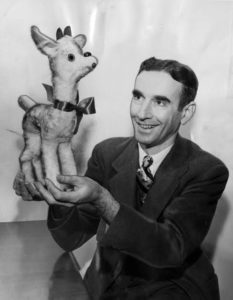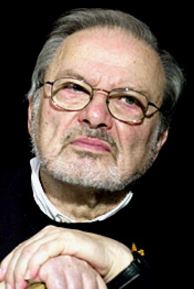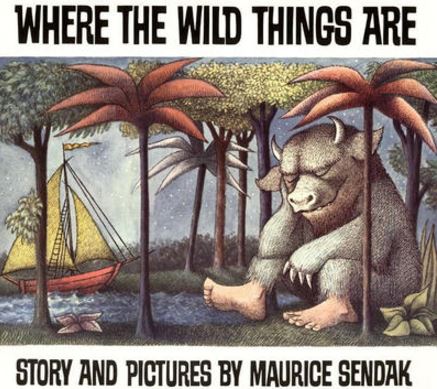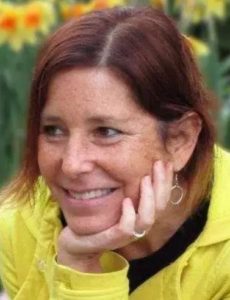Rudolph the Red-Nosed Reindeer
 Robert Lewis May (1905-1976) was born in Long Island, New York to a Jewish family, devoted members of the “Ethical Culture Society” which grew out of Reform Judaism. He studied psychology in Dartmouth College and was particularly drawn to the work of Alfred Adler, who suggested that the main drive of all human beings is to overcome inferiority and attain some sort of perfection. May went on to work as a copywriter and marketer for a number of department stores. The family lost everything during the Great Depression, and May’s wife was also battling cancer at the same time. In 1939, May’s boss at Montgomery Ward asked him to write some new promotional material for Christmas shoppers featuring a loveable animal character. May went to the zoo with his four-year-old daughter to get ideas, and eventually came up with Rudolph the Red-Nosed Reindeer, combining elements of the Ugly Duckling with his own difficult childhood as a Jewish kid, and the psychology of Alfred Adler. Although his wife tragically died as he was working on the book, he continued the project in her memory. The book became an instant classic and over 5 million copies were distributed over the next several years. In 1948, May reached out to his composer brother-in-law (former Jew of the Week) Johnny Marks to write music for a song adaptation. ‘Rudolph the Red-Nosed Reindeer’ was a hit, and is now the second most popular Christmas song of all time (after ‘White Christmas’). May went on to start a full-time Rudolph business, which he ran until 1958, before returning to work as a copywriter for Montgomery Ward. May wrote other children’s books, too, featuring characters like Benny the Bunny and Winking Willie. Meanwhile, Rudolph the Red-Nosed Reindeer went off to spawn numerous sequels, film adaptations, toys, and over 100 other products, and remains one of the most beloved Christmas characters today.
Robert Lewis May (1905-1976) was born in Long Island, New York to a Jewish family, devoted members of the “Ethical Culture Society” which grew out of Reform Judaism. He studied psychology in Dartmouth College and was particularly drawn to the work of Alfred Adler, who suggested that the main drive of all human beings is to overcome inferiority and attain some sort of perfection. May went on to work as a copywriter and marketer for a number of department stores. The family lost everything during the Great Depression, and May’s wife was also battling cancer at the same time. In 1939, May’s boss at Montgomery Ward asked him to write some new promotional material for Christmas shoppers featuring a loveable animal character. May went to the zoo with his four-year-old daughter to get ideas, and eventually came up with Rudolph the Red-Nosed Reindeer, combining elements of the Ugly Duckling with his own difficult childhood as a Jewish kid, and the psychology of Alfred Adler. Although his wife tragically died as he was working on the book, he continued the project in her memory. The book became an instant classic and over 5 million copies were distributed over the next several years. In 1948, May reached out to his composer brother-in-law (former Jew of the Week) Johnny Marks to write music for a song adaptation. ‘Rudolph the Red-Nosed Reindeer’ was a hit, and is now the second most popular Christmas song of all time (after ‘White Christmas’). May went on to start a full-time Rudolph business, which he ran until 1958, before returning to work as a copywriter for Montgomery Ward. May wrote other children’s books, too, featuring characters like Benny the Bunny and Winking Willie. Meanwhile, Rudolph the Red-Nosed Reindeer went off to spawn numerous sequels, film adaptations, toys, and over 100 other products, and remains one of the most beloved Christmas characters today.
Words of the Week
In the 1930s, antisemites declared, ‘Jews to Palestine’. Today they shout, ‘Jews out of Palestine’… They don’t want us to be there; they don’t want us to be here; they don’t want us to be.
– Amos Oz

 Maurice Bernard Sendak (1928-2012) was born in Brooklyn to Polish-Jewish immigrants. He fell in love with books during a lengthy childhood illness, and after watching Disney’s Fantasia at age 12, decided to become an illustrator. Skipping college, Sendak first did illustrations for toy store windows before having his art published in a textbook. He then devoted himself to illustrating children’s books, including many Jewish themed ones like Good Shabbos Everybody. (Sendak once noted that one of his greatest inspirations was his father’s telling of stories from the Torah.) By the late 1950’s, he started writing his own children’s books. His most famous work came in 1963, and made Sendak a household name. Where the Wild Things Are was very controversial when first published, criticized for its edgy theme and “dark” illustrations. Sendak attributed this to his own difficult childhood, having lost many family members in the Holocaust. Nonetheless, the book became hugely popular, and went on to sell over 20 million copies worldwide. It has since been adapted into a Hollywood film and even an opera, and has been ranked as the best picture book of all time. All in all, Sendak authored 22 books, illustrated 90 more, and wrote, directed, or produced seven films. He saw himself not as a children’s author, but an “author who told the truth about children”. Sendak won many awards, including the National Medal of the Arts, and the prestigious Hans Christian Andersen Award for “lasting contribution to children’s literature”. Sendak donated $1 million to New York’s Jewish Board of Family and Children’s Services, and left his precious collection of over 10,000 artworks, books, and manuscripts to be turned into a museum and library. He was a humble man, and avoided book signings because he “couldn’t stand the thought of parents dragging children to wait in line for hours to see a little old man in thick glasses.” After his passing of a stroke at age 83, The New York Times hailed him as “the most important children’s book artist of the 20th century.”
Maurice Bernard Sendak (1928-2012) was born in Brooklyn to Polish-Jewish immigrants. He fell in love with books during a lengthy childhood illness, and after watching Disney’s Fantasia at age 12, decided to become an illustrator. Skipping college, Sendak first did illustrations for toy store windows before having his art published in a textbook. He then devoted himself to illustrating children’s books, including many Jewish themed ones like Good Shabbos Everybody. (Sendak once noted that one of his greatest inspirations was his father’s telling of stories from the Torah.) By the late 1950’s, he started writing his own children’s books. His most famous work came in 1963, and made Sendak a household name. Where the Wild Things Are was very controversial when first published, criticized for its edgy theme and “dark” illustrations. Sendak attributed this to his own difficult childhood, having lost many family members in the Holocaust. Nonetheless, the book became hugely popular, and went on to sell over 20 million copies worldwide. It has since been adapted into a Hollywood film and even an opera, and has been ranked as the best picture book of all time. All in all, Sendak authored 22 books, illustrated 90 more, and wrote, directed, or produced seven films. He saw himself not as a children’s author, but an “author who told the truth about children”. Sendak won many awards, including the National Medal of the Arts, and the prestigious Hans Christian Andersen Award for “lasting contribution to children’s literature”. Sendak donated $1 million to New York’s Jewish Board of Family and Children’s Services, and left his precious collection of over 10,000 artworks, books, and manuscripts to be turned into a museum and library. He was a humble man, and avoided book signings because he “couldn’t stand the thought of parents dragging children to wait in line for hours to see a little old man in thick glasses.” After his passing of a stroke at age 83, The New York Times hailed him as “the most important children’s book artist of the 20th century.”
 Amy Renee Krouse Rosenthal (1965-2017) was born in Chicago and studied at Tufts University. A naturally creative and spiritual person, she described herself simply as “a person who likes to make things”. After working in advertising for nine years, Rosenthal decided to pursue her passion and becoming a writer. She published her first book in 1998 and went on to write 30 more, most of them children’s books. Many were New York Times Bestsellers, and Rosenthal is the only author to have three children’s books on the list of Best Children’s Books for Family Literacy in the same year. Her book Duck! Rabbit! was read publicly at the White House in 2010, and her adult book Encyclopedia of an Ordinary Life was named one of the top ten memoirs of the decade. She also published 10 journals and created many short films, several of which went viral. Rosenthal was often seen at TED talks, designing three conferences and speaking at another three. She wrote for a number of newspapers and magazines as well, including Parenting, The Oprah Magazine, and The New York Times. It was in the latter publication that she wrote an essay earlier this month revealing that she had terminal cancer. The
Amy Renee Krouse Rosenthal (1965-2017) was born in Chicago and studied at Tufts University. A naturally creative and spiritual person, she described herself simply as “a person who likes to make things”. After working in advertising for nine years, Rosenthal decided to pursue her passion and becoming a writer. She published her first book in 1998 and went on to write 30 more, most of them children’s books. Many were New York Times Bestsellers, and Rosenthal is the only author to have three children’s books on the list of Best Children’s Books for Family Literacy in the same year. Her book Duck! Rabbit! was read publicly at the White House in 2010, and her adult book Encyclopedia of an Ordinary Life was named one of the top ten memoirs of the decade. She also published 10 journals and created many short films, several of which went viral. Rosenthal was often seen at TED talks, designing three conferences and speaking at another three. She wrote for a number of newspapers and magazines as well, including Parenting, The Oprah Magazine, and The New York Times. It was in the latter publication that she wrote an essay earlier this month revealing that she had terminal cancer. The